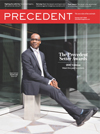In the past, most community legal clinics in Toronto worked out of cramped, overcrowded offices. Funding, through the Ontario government and private donations, was always in short supply. But a small group of legal clinics, which serve the province’s most disenfranchised, has banded together to change things up in an unusual way. This past winter, they moved into a shared downtown office space to help them run (and look) like a lean startup.
Eight legal clinics,  as well as the headquarters for the Association of Community Legal Clinics of Ontario (ACLCO), took part in the initiative. Before the big move, most of them were stationed in separate offices across the city. But now, they occupy two floors at 55 University Ave., in the downtown core. “The genesis of this came out of conversations clinics were having about better ways to collaborate,” says Lenny Abramowicz, executive director of the ACLCO. “The clinics really took the bull by the horns and ran with it.”
as well as the headquarters for the Association of Community Legal Clinics of Ontario (ACLCO), took part in the initiative. Before the big move, most of them were stationed in separate offices across the city. But now, they occupy two floors at 55 University Ave., in the downtown core. “The genesis of this came out of conversations clinics were having about better ways to collaborate,” says Lenny Abramowicz, executive director of the ACLCO. “The clinics really took the bull by the horns and ran with it.”
Because dozens of like-minded lawyers now work out of one space, it’s easier than ever for them to support each other. “At big law firms, lawyers have access to all sorts of mentoring,” says Mary Birdsell, executive director of Justice for Children and Youth, one of the participating clinics. “In this new context, we now have similar opportunities. That, in turn, helps us better serve our communities.”
The impressive 28,906-square-foot space features a reception area that’s full of natural light. On one of the floors, offices and conference rooms dot the perimeter. And in the middle of the space, computers and desks serve as workspaces. There’s even a shared library.
One obvious benefit of this sort of resource pooling is the cost savings. The clinics can easily share day-to-day expenses, such as office equipment. And with an attractive downtown office — that, as a bonus, is situated next to the entrance of the St. Andrew subway station — they can now host their own community events, instead of renting expensive hotel venues. That, of course, saves money.
Ultimately, the clinics hope to pass those savings onto Torontonians in need. Over time, with less money going to expenses, they should be able to fund more cases and hire more staff. “This is not about digging out profits,” says Ryan Peck, a lawyer and executive director of HIV & AIDS Legal Clinic Ontario, a tenant at the new location. “When we work together in a space like this, it’s about furthering justice.”
 This story is from our Summer 2017 issue.
This story is from our Summer 2017 issue.
Illustration by Alina Skyson


